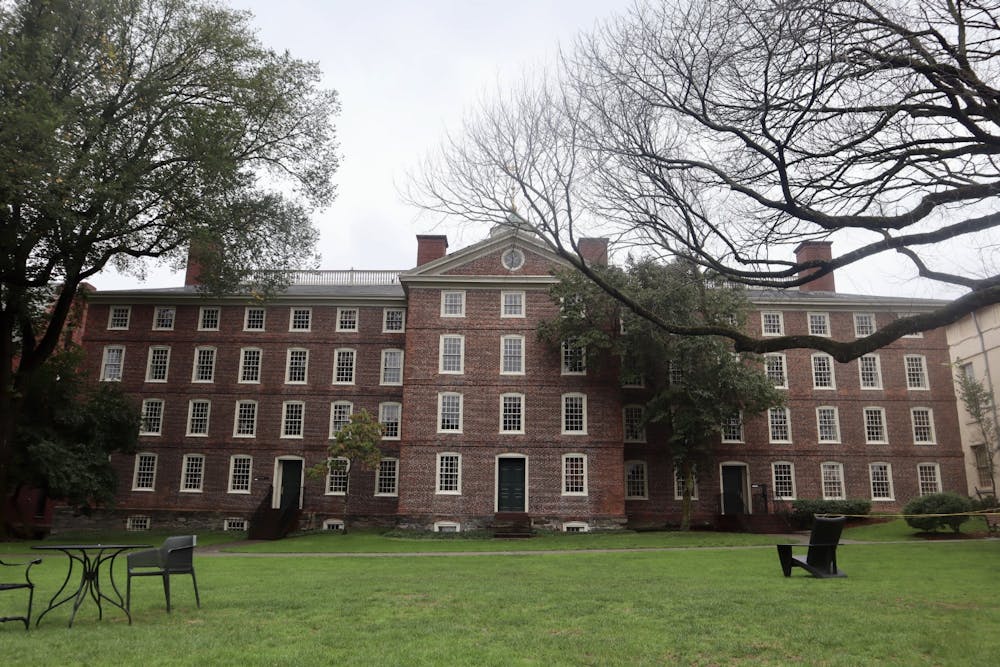Nearly a month after former Harvard President Claudine Gay resigned from her post, Brown student group leaders expressed differing reactions to the departure.
Gay resigned from her presidency on Jan. 2, following former Penn President Liz Magill’s December departure, The Herald previously reported. Gay’s leave followed a December Congressional hearing on campus antisemitism and a series of plagiarism allegations and investigations.
Congressional hearing on antisemitism
When asked about Gay’s resignation, some discussed last month’s federal hearing on campus antisemitism.
“The congressional hearing highlighted the terrifying double standard, by Gay and others, when it comes to a commitment to equal treatment when protecting minority groups on campus,” wrote Ben Marcus ’26, vice president of Brown Students for Israel, in a message to The Herald.
Nick Lee ’26, co-president of Students for Educational Equity, discussed the role of educational leaders in condemning antisemitism and the challenge for them to balance that with their own stances on sociopolitical issues.
“Although I understand that there is difficulty surrounding today’s climate and whether or not to support Palestine, to unequivocally call for the end of racial or religious discrimination is necessary,” Lee said, referencing antisemitism.
Lee advised that educational administrators “be careful with (their) words” and ensure “student safety.”
Lee said he also balances “what exactly (he himself is) able to say” when acting as a student representative. He noted his affiliated opinions as a member of student group leadership. “SEE has openly supported work for Palestine,” Lee said, pointing to a “human rights crisis, an education crisis and a crisis for many children.”
Plagiarism backlash and university trust
In addition to opinions on Gay’s congressional statements, student leaders discussed complex feelings on other aspects of Gay’s resignation — with some connecting the backlash she underwent to broader social issues.
Jada Wooten ’24, co-president of Black Student Union, pointed to her own identity as a Black Ivy Leaguer and daughter of college professors when describing her initial reaction to the news.
“On one hand, many were inspired to see a Black leader at one of the world’s most prestigious institutions. On the other hand, many Black people, especially femmes, can resonate with a desire to protect your peace from the burnout that can come with being Black at a (predominantly white institution),” Wooten wrote in a message to The Herald.
“When I heard the news I was saddened by the brevity of her tenure, but also (understood) the importance of protecting your peace,” she added.
For Wooten, the allegations of plagiarism by Gay — Harvard’s first Black president — were more complicated than some critics argued.
“While I believe plagiarism is a serious issue, from my understanding, many of the accusations were uncalled for and rooted in racism,” Wooten said, stating the public scrutiny against Gay’s alleged academic misconduct was “one of many examples” of “anti-Black racism in academia.”
Wooten pointed to the allegations of Gay plagiarizing book acknowledgments by Jennifer Hoschild, as well as allegations of plagiarizing David T. Canon’s discussion of the Voting Rights Act — both of which were disputed by the respective writers.
In discussing plagiarism, Lee mentioned the potential implications of public distrust for universities.
“We have people like Claudine Gay … that are coming under attack not just for what they should say, but for things like plagiarism and educational information,” Lee said, adding that this challenges university trustworthiness in an era where “education and information are becoming politicized.”
“It’s scary that educators and universities are (almost) not being able to make political takes,” he added. “Universities have been a large part of social movements. A lot of that is driven by a clause of intellectuality, and now university presidents and administrators are being threatened with that.”
Gay’s presidency and Brown
Following the reactions to Gay’s tenure and resignation, student leaders shared reflections and potential lessons for other educational leadership — including at Brown.
For Marcus, reflections on Gay’s hearing statements highlighted a positive aspect of University leadership by President Christina Paxson P’19 P’MD’20.
“I am glad that (Paxson) has been a great partner for the Jewish community on campus and a model of leadership in making it clear that disagreement with the Israeli government is not an excuse for antisemitism,” he said.
Paxson received public criticism from students at a November vigil due to the University’s ties to Israel, The Herald previously reported.
For Wooten, the controversy surrounding Gay’s departure could spark important race-related dialogue on Brown’s campus.
“I believe Gay’s resignation should inspire more conversations about racism in academia,” she said. “When I reflect on Brown specifically, it is one thing to have commissioned the Slavery and Justice Report, but it is another to be committed to living out its recommendations.”
Samantha is a University News editor who oversees the Affinity & Activism beat. She is a sophomore from Tampa, Florida concentrating in Sociology. In her free time, Samantha likes to cook and watch Survivor.





